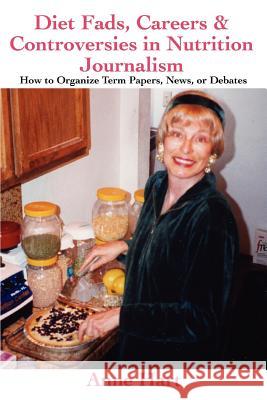Diet Fads, Careers and Controversies in Nutrition Journalism: How to Organize Term Papers, News, or Debates » książka
Diet Fads, Careers and Controversies in Nutrition Journalism: How to Organize Term Papers, News, or Debates
ISBN-13: 9780595378234 / Angielski / Miękka / 2005 / 304 str.
Diet Fads, Careers and Controversies in Nutrition Journalism: How to Organize Term Papers, News, or Debates
ISBN-13: 9780595378234 / Angielski / Miękka / 2005 / 304 str.
(netto: 72,42 VAT: 5%)
Najniższa cena z 30 dni: 75,62
ok. 16-18 dni roboczych.
Darmowa dostawa!
Do you need to write a school term paper on nutrition? Are you interested in how to find a journalism job, open a business, or learn to write and speak about scientifically-substantiated plant extracts, nutrition, health, or consumer economics communication? Can you bridge the gap between science and the consumer with understandable explanations? Here's how to write news or magazine articles in plain language about the science behind foods, supplements, or lifestyles for readers without technical training. As freelance writers, students, librarians, educators, parents, nurses, nutritionists, chefs, speakers, or current information researchers learn how to inform general magazine or newspaper readers about current scientific findings that help people better control their blood sugar, lifestyles, and nutrition.
For example, diabetes is expected to surpass cancer and heart disease as America's leading killer by 2010. Learn how to write or speak in public about nutrition, consumer economics, current epidemics, or blood pressure issues for popular media.
Practice here how to interview experts. Write actual questions you'd ask professionals. Ask to interview those with reliable information by sending a list of questions ahead of the interview. Gather speakers for conference panels by volunteering at professional associations' meetings. The nutrition glossary at the back of the book is a helpful resource for definitions.
Shifting to another topic-attention deficit disorder-learn what nutrients and essential fatty acids help to manage attention deficit hyperactivity disorder. Can you write about or debate issues and controversies on the health benefits of phytocompounds? Examples of phytocompounds include quercetin and resveratrol. Can you find the words 'phytocompounds' and 'polyphons' in your dictionary? How would you discuss the words 'quercetin' and 'resveratrol?' Learn to define these terms to the general public in popular consumer magazines. Write news articles, organize debates, manage your term papers based upon the credibility of studies mentioning health benefits. Avoid food misinformation in the media.
How do you explain the reduced cardiovascular risk and similar benefits of the latest nutrition-related research? Can you write in plain language for a magazine or newspaper how fish rich in omega-3 fatty acids, olive oil polyphons, and fruits, vegetables or herbs offers specific health benefits? If you're thinking about a career in consumer economics communication or nutrition journalism, or are a school librarian or educator, here's how to work with reliable resources.











